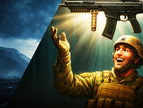Interview with Westie
- Tom Belous (The Lanky Soldier)

- Jul 17, 2025
- 8 min read
A deep dive into Westie's journey as a creator, his insights on Battlefield’s evolution, and the crossover with Call of Duty

In Episode 19 of the Battlefield One Podcast, Tom (TheLankySoldier) sat down for an in-depth discussion with one of the FPS community’s most recognized voices: Westie. A veteran content creator who has covered Battlefield for over a decade, Westie’s insights are valuable not just to Battlefield fans, but to anyone interested in the shifting landscape of multiplayer shooters. This article is a small glimpse of the full interview that happened at Battlefield One Podcast, as it explores Westie's background, his perspective on Battlefield and Call of Duty, and where he thinks the genre is heading. We recommend to listen to the full episode whenever you can.
Westie’s FPS journey began not with Call of Duty, but with Battlefield: Bad Company on the PlayStation 3. Unlike many players who came up through fast-paced shooters, Westie was drawn to Battlefield’s larger, more tactical sandbox. Over time, he became a major presence in the Battlefield content scene, and later extended into Call of Duty, particularly after the rise of Warzone.
This episode isn't just about Westie’s career; it reflects the broader struggles and shifts in the Battlefield franchise, from its golden days in the early 2010s to its more divisive entries like Battlefield V and 2042.
Tom and Westie cover a wide range of themes during the episode. They start with Westie’s origin story: uploading clips to share with friends during Battlefield 3 and gradually building a channel from the ground up. They reflect on key Battlefield titles, with special emphasis on Battlefield 4, which Westie calls “the best Battlefield game” despite its rough launch.

They also talk about the emotional impact and missed potential of Battlefield 1’s launch, the "Specialist" shift with Battlefield 2042, and how Call of Duty once the butt of jokes among Battlefield fans, has managed to win over large parts of the FPS audience. Central to this discussion is the idea that Battlefield has lost sight of its identity, and that both players and developers no longer share a clear vision of what Battlefield should be.
Q: Why did you choose Battlefield over Call of Duty?
Westie: "I got into Battlefield because it offered something different. One of my mates said to me, 'It’s like Call of Duty but slower,' and that was exactly what I was looking for. I wasn’t into the twitchy, super-fast gameplay that CoD was known for. I liked the idea of larger battles, using vehicles, and working as a team. Bad Company on PS3 really opened my eyes to a different kind of shooter, more strategic, more immersive. That’s what hooked me."
Q: What made you start uploading content?
Westie: "Honestly, it started pretty simple. I just wanted to share some clips with my friends. YouTube was basically a free video hosting service back then, nothing like the platform it is today. But some of those videos started getting more views than I expected, like hundreds, when I only sent the link to three mates. That’s when I realized maybe there were people out there who wanted to see this kind of stuff. From there, it just kind of snowballed. I kept uploading, started posting on Battlefield forums and it just grew."
Q: What’s your favorite Battlefield game?
Westie: "My personal favorite is Bad Company 2, just because of the emotional connection and the fun I had with it. But if we’re talking about what I think is objectively the best, I’d say Battlefield 4. It had a rough launch, yeah, but it grew into this beautifully chaotic, polished sandbox. Every time I jumped in, something wild or awesome happened. It had depth, variety, and it really nailed what Battlefield is supposed to be about."

Q: How do you feel about the shift to Specialists in Battlefield 2042?
Westie: "It just didn’t work. Specialists tried to bring in personality, but they ended up removing the clarity and structure that classes gave the game. Everyone running around with different abilities made it hard to understand what anyone’s role was. The voice lines were cringey, the characters felt out of place in the setting, and overall it just confused the core gameplay loop. It wasn’t Battlefield anymore. It felt like they were trying to chase trends rather than stick to what made their franchise great."
Q: What does Battlefield mean to you?
Westie: "Battlefield to me means chaos, but the good kind. You’ve got tanks, infantry, jets, massive maps, objectives changing hands constantly. It’s unpredictable and epic. But there’s structure in that chaos. Classes, squads, teamwork, all of that gives the madness a purpose. That balance is what makes Battlefield special."
Q: Did Battlefield 1 innovate or was it just style over substance?
Westie: "It definitely had that lightning-in-a-bottle moment. Nobody expected WWI, and that trailer just blew everyone away. I was lucky enough to play it early and I remember seeing the cloaks, the heavy soldiers, the horses, it was stunning. But the launch version lacked content. There weren’t enough weapons or variation to keep people engaged long term. It looked amazing and had an incredible first impression, but yeah, it was more style than substance when you look back."

Q: Why did you move into Call of Duty content?
Westie: "Warzone. That was the game that got me. Not the regular 6v6 stuff, I never liked that. But Warzone came at the perfect time, right when the world went into lockdown. It was big, tactical, and had that feeling of importance with every match. It reminded me of what I loved in Battlefield, but it was more polished and accessible. Honestly, they struck gold with the timing and design."
Q: What makes Battle Royale so appealing in your opinion?
Westie: "It’s the stakes. In Conquest, you might capture five flags and lose three and it’s just kind of a blur. But in BR, every decision matters. You survive, you adapt, you overcome. That victory at the end, it feels earned, and not everyone gets one every session. It’s that emotional reward, that adrenaline rush. I think that kind of experience fits really well into Battlefield’s squad-based, chaotic sandbox."
Q: Do you think Firestorm could have succeeded?
Westie: "Yeah, I actually do. The concept was good - ring of fire, destructible environments, Battlefield mechanics in a BR mode. But it came way too late. If they had released it two years earlier, during PUBG’s rise, and made it free-to-play? It might have been huge. Instead, it was locked behind Battlefield V and felt like an afterthought. That timing cost them big."

Q: What are your thoughts on the rumored Battle Royale in the next Battlefield?
Westie: "I’m cautiously optimistic. Having Byron Beede involved, that’s the guy who helped launch Warzone, makes me sit up and pay attention. If they bring in classes instead of loadouts, focus on squad synergy, and make sure it plays like Battlefield rather than copying CoD, it could be really good. They’ve got the right people now, like Vince Zampella leading the franchise, so I’ve got hope. But they have to nail the vision."
Q: What do you think about Delta Force as a Battlefield competitor?
Westie: "Honestly, competition is good. Battlefield needs it. Delta Force clearly takes heavy inspiration from 2042, but that’s not necessarily a bad thing if they learn from those mistakes. I played it for a couple hours at TwitchCon and it felt solid, great gunplay, grounded movement. If they can build on that and keep the community engaged, it could be something special. But they’ve got to execute."
Q: What are some missed opportunities in recent Battlefield titles?
Westie: "Where do I start? Specialists were one. Hazard Zone was another. It had potential to be Battlefield’s version of an extraction mode, but it launched totally underbaked. And the tone of the game didn’t match the world they were trying to build. Irish was a great character, and they had this cinematic short that was really strong, but they didn’t follow through. It just felt like a lot of half-baked ideas."
Q: How important is branding in shooters today?
Westie: "Massive. Look at Delta Force—if it had launched under a different name, no one would care. But because it has that old-school recognition, people are watching. Battlefield still has that brand power, but they need to re-earn the trust. The name alone won’t save them anymore. You have to show people what Battlefield stands for again."

Q: How do you feel about player agency in modern shooters?
Westie: "I think it’s vital. One of the things I loved about older Battlefield games was that you could really carve out your own playstyle. You had tools to create your own moments. Modern games sometimes restrict that with too many systems or cosmetics that push you in a certain direction. I want to feel like my decisions matter, not just my aim, but my strategy, my loadout, my squad synergy." Q: What’s the role of community feedback in shaping FPS games today?
Westie: "It’s crucial, but it has to be filtered smartly. Devs need to listen, absolutely, but they also need to read between the lines. Sometimes players say they want X, but what they really mean is they’re unhappy with Y. The best dev teams know how to interpret the spirit of the feedback, not just the words." Q: What would you change if you were leading Battlefield development?
Westie: "First thing? Bring back a real class system with depth. Next, give players more freedom, custom servers, mod tools, progression that isn’t tied to FOMO. And third: make it feel like a living battlefield. Destruction, teamplay incentives, map dynamics. It has to feel alive again."
This interview is as much a conversation about Westie’s journey as it is about the identity crisis facing Battlefield. The franchise once known for innovation, scale, and community flexibility has become inconsistent. But the podcast also presents a hopeful path: stronger leadership, meaningful class-based systems, thoughtful integration of BR, and a renewed focus on community-driven play.
Westie’s appearance on the Battlefield One Podcast wasn’t just a trip down memory lane—it was a sharp analysis of what makes shooters succeed. It reminded us that FPS games are not just about mechanics, but about experience, identity, and meaning.
Whether you’re a long time Battlefield fan, a Call of Duty player, or just an FPS enjoyer, there’s plenty to learn from what Westie shares.
This article is brought to you by the Battlefield One Podcast, where we break down announcements like this, analyze gameplay footage, and track the development of Battlefield week to week. Whether you're new to the franchise or a returning veteran, follow us on Spotify, Apple Podcasts, YouTube, or wherever you listen, and get the full picture behind the frontlines.
Before you go... Thank you for reading this article from Battlefield One Podcast - we appreciate you taking the time to be on this website and read everything we have to say. If you enjoyed what you read, be sure to check out our full podcast episodes, where we discuss the history, chaos, news, updates and community "temperature" behind the Battlefield franchise in even more detail.
This website is entirely ad-free and independently run. We’re able to keep it online, maintain the archive of all our episodes, and keep creating new content thanks to the generous support from our listeners through Patreon and direct donations. If you value what we’re building here and want to help us keep going, please consider subscribing or making a contribution.
Every bit of support means the world to us and helps us stay focused on what matters - delivering honest, detailed, no nonsense Battlefield related content without compromise.
Please go to Patreon.com/TheLankySoldier or our dedicated donation page on this website, Battlefieldone.net/Donation































